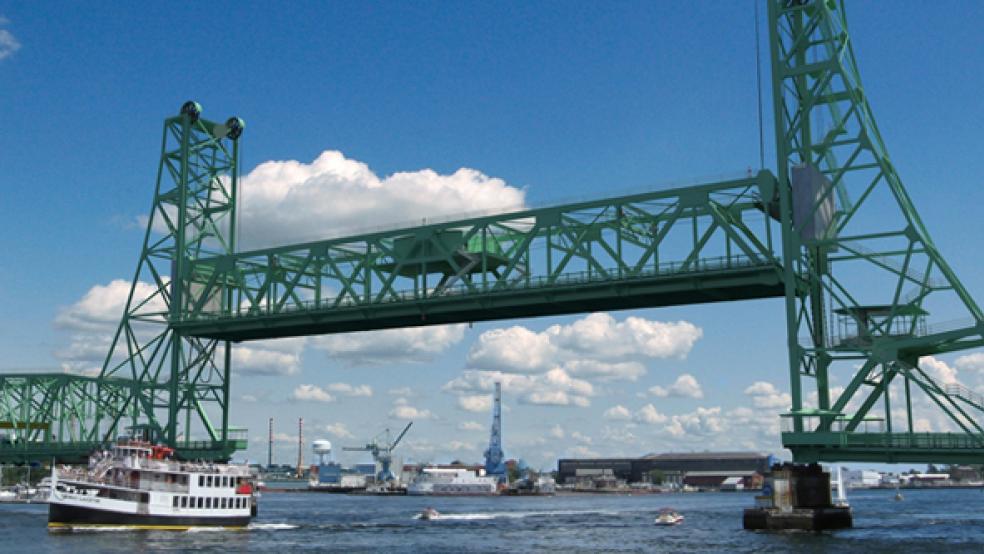Repair it, replace it or close it? That is the stark choice that confronts America’s state and local governments as they decide what to do with bridges, dams, rail corridors and highways that have been in service long past their expiration dates. Many remain vital conduits of commerce and letting them deteriorate could only bring further expense. This is the first in a series called Rebuilding America that will report on infrastructure projects around the country.
Memorial Bridge: Portsmouth, N.H. to Kittery, Maine
The 1921 lift bridge over the Piscataqua River from Maine to New Hampshire is in dire need of repairs, with its steel girders corroding from years of salt. The state of New Hampshire has deemed it the only “red-listed” bridge in the state. Replacement work could start next year if the money is found in the hard-pressed state budgets.
What’s at Stake: This is the only bridge that directly links the downtowns of Kittery (pop. 9,543) and Portsmouth (pop. 20,784), and the only one with pedestrian and bicycle access. Most of the New Hampshire residents who work at the Portsmouth Naval Shipyard use this bridge. Approximately 80 percent of Maine’s gross domestic product is said to pass over the three bridges over the Piscataqau near Portsmouth: the Memorial, the Sarah Long and the Interstate 95 bridge. That includes spring water, textiles, potatoes, blueberries and, of course, lobsters. Shutting down the Memorial would shunt traffic onto Interstate 95 and create a major logistical and economic headache with no easy solution.
Where It’s Located: The Piscataqua River, actually a tidal estuary, is the border between Maine and New Hampshire for about twelve miles, and flows into Atlantic ocean. There is only one state in the U.S. that has a border with only one other state — that state is Maine and this is the primary choke-point.

Total cost of replacement: $90 million
Total cost of emergency repairs: The state of New Hampshire shut it down for three weeks in December to replace gusset plates on the side, which cost taxpayers $30,000. This shoring-up is not expected to last longer than two years, leaving open the possibility of eventual collapse from rotting floor beams and trusses if a solution is not found. “The concern we have is that some of the main floor beams will be the next thing to deteriorate and those can’t be repaired,” said Ben Porter of Save Our Bridges, a local advocacy group.
Total cost of shutdown: Porter’s group estimates the economy of York County, Maine would suffer a 40 percent drop.
Who pays: The federal government has committed $20 million in TIGER II grants, but the two states are still trying to determine how the remaining costs will be split between them. The New Hampshire Department of Transportation is nevertheless moving forward and has issued a request for qualifications asking for a general contractor to both design and build a new bridge with a similar 1920s era aesthetic, with a span that can be winched high enough to accommodate fuel and container ship traffic passing underneath.
Jobs created: Neither state has an available estimate, but projects of comparable scope have created or supported approximately 2,400 construction jobs, most of which would lose their support after the 18 month rebuild is complete.
Political challenges: Dismantling the bridge or leaving it permanently closed is an option, though it would create heavy levels of congestion. The National Trust for Historic Preservation in New England calls this one of “11 Most Endangered Historic Places.” Previous plans to rebuild the bridge have failed when bids came in high and Maine officials could not locate enough money. Still, the alarming state of the bridge could force both states, as well as the federal government, to up their commitments. "This is probably one of the worst bridges in America,” U.S. Transportation Secretary Ray LaHood has said.
Thanks to Bill Boynton of the New Hampshire Department of Transportation and Mark Latti of the Maine Department of Transportation.
Related Links:
Anti-Business Bias Could Derail Infrastructure Fix (The Fiscal Times)
The 10 Pieces of U.S. Infrastructure We Must Fix Now (Popular Mechanics)
The Time To Invest In Infrastructure Is Now And It's About More Than Emerging Markets (Business Insider)





